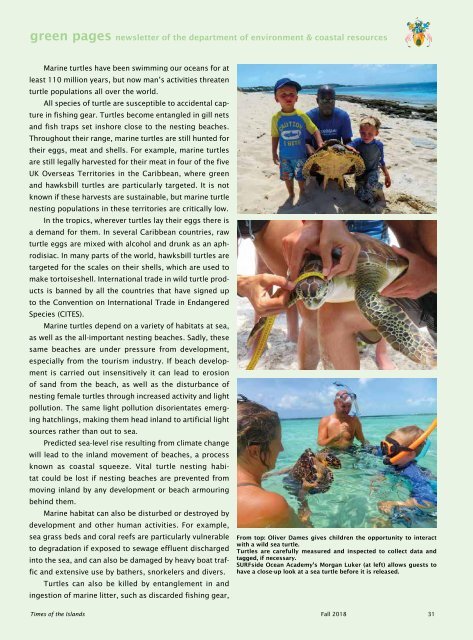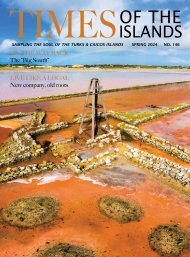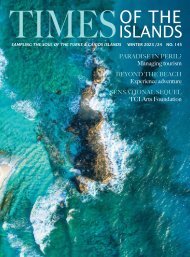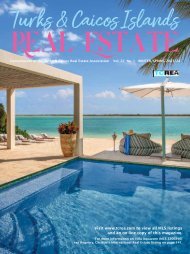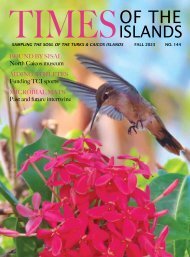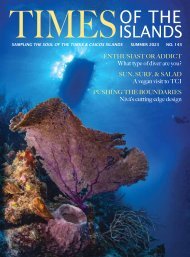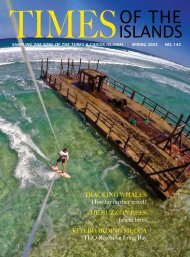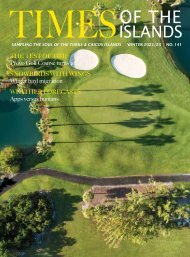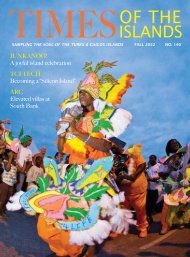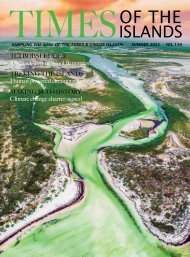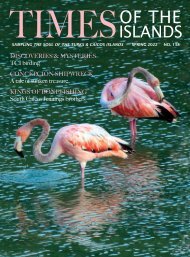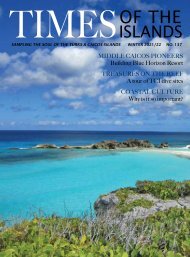Times of the Islands Fall 2018
Presents the "soul of the Turks & Caicos Islands" with in-depth features about local people, culture, history, environment, businesses, resorts, restaurants and activities.
Presents the "soul of the Turks & Caicos Islands" with in-depth features about local people, culture, history, environment, businesses, resorts, restaurants and activities.
You also want an ePaper? Increase the reach of your titles
YUMPU automatically turns print PDFs into web optimized ePapers that Google loves.
green pages newsletter <strong>of</strong> <strong>the</strong> department <strong>of</strong> environment & coastal resources<br />
Marine turtles have been swimming our oceans for at<br />
least 110 million years, but now man’s activities threaten<br />
turtle populations all over <strong>the</strong> world.<br />
All species <strong>of</strong> turtle are susceptible to accidental capture<br />
in fishing gear. Turtles become entangled in gill nets<br />
and fish traps set inshore close to <strong>the</strong> nesting beaches.<br />
Throughout <strong>the</strong>ir range, marine turtles are still hunted for<br />
<strong>the</strong>ir eggs, meat and shells. For example, marine turtles<br />
are still legally harvested for <strong>the</strong>ir meat in four <strong>of</strong> <strong>the</strong> five<br />
UK Overseas Territories in <strong>the</strong> Caribbean, where green<br />
and hawksbill turtles are particularly targeted. It is not<br />
known if <strong>the</strong>se harvests are sustainable, but marine turtle<br />
nesting populations in <strong>the</strong>se territories are critically low.<br />
In <strong>the</strong> tropics, wherever turtles lay <strong>the</strong>ir eggs <strong>the</strong>re is<br />
a demand for <strong>the</strong>m. In several Caribbean countries, raw<br />
turtle eggs are mixed with alcohol and drunk as an aphrodisiac.<br />
In many parts <strong>of</strong> <strong>the</strong> world, hawksbill turtles are<br />
targeted for <strong>the</strong> scales on <strong>the</strong>ir shells, which are used to<br />
make tortoiseshell. International trade in wild turtle products<br />
is banned by all <strong>the</strong> countries that have signed up<br />
to <strong>the</strong> Convention on International Trade in Endangered<br />
Species (CITES).<br />
Marine turtles depend on a variety <strong>of</strong> habitats at sea,<br />
as well as <strong>the</strong> all-important nesting beaches. Sadly, <strong>the</strong>se<br />
same beaches are under pressure from development,<br />
especially from <strong>the</strong> tourism industry. If beach development<br />
is carried out insensitively it can lead to erosion<br />
<strong>of</strong> sand from <strong>the</strong> beach, as well as <strong>the</strong> disturbance <strong>of</strong><br />
nesting female turtles through increased activity and light<br />
pollution. The same light pollution disorientates emerging<br />
hatchlings, making <strong>the</strong>m head inland to artificial light<br />
sources ra<strong>the</strong>r than out to sea.<br />
Predicted sea-level rise resulting from climate change<br />
will lead to <strong>the</strong> inland movement <strong>of</strong> beaches, a process<br />
known as coastal squeeze. Vital turtle nesting habitat<br />
could be lost if nesting beaches are prevented from<br />
moving inland by any development or beach armouring<br />
behind <strong>the</strong>m.<br />
Marine habitat can also be disturbed or destroyed by<br />
development and o<strong>the</strong>r human activities. For example,<br />
sea grass beds and coral reefs are particularly vulnerable<br />
to degradation if exposed to sewage effluent discharged<br />
into <strong>the</strong> sea, and can also be damaged by heavy boat traffic<br />
and extensive use by ba<strong>the</strong>rs, snorkelers and divers.<br />
Turtles can also be killed by entanglement in and<br />
ingestion <strong>of</strong> marine litter, such as discarded fishing gear,<br />
From top: Oliver Dames gives children <strong>the</strong> opportunity to interact<br />
with a wild sea turtle.<br />
Turtles are carefully measured and inspected to collect data and<br />
tagged, if necessary.<br />
SURFside Ocean Academy’s Morgan Luker (at left) allows guests to<br />
have a close-up look at a sea turtle before it is released.<br />
<strong>Times</strong> <strong>of</strong> <strong>the</strong> <strong>Islands</strong> <strong>Fall</strong> <strong>2018</strong> 31


